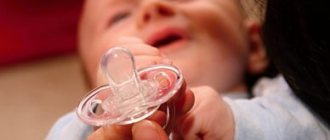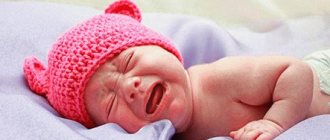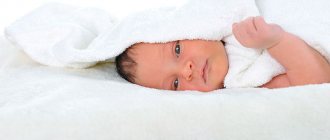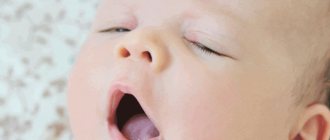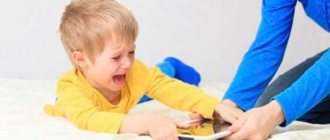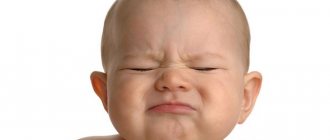Why do children cry after bathing? Reasons for crying, tips and recommendations for parents
After being discharged from the hospital, happy parents are faced with a large number of questions, the answers to which they will have to find in the next few months. How to put a child to sleep, what is the best way to feed, why children cry after bathing - this is not a complete list of problems that all young mothers and fathers have to solve.
Reasons for baby crying after bathing
The purpose of bathing a newborn baby is not only to cleanse his skin of all kinds of impurities, but also to calm him down and prepare him for sleep. However, sometimes this procedure has the opposite effect. Instead of relaxing and wanting to sleep, the child begins to cry a lot and it can be difficult even for the mother to calm him down.
Possible reasons why an infant cries after bathing:
- Sudden temperature changes. If the temperature in the room where the child is used to being is not too high (22-23°C), and the water in the bathroom significantly exceeds this figure. This may cause some discomfort and, as a result, the baby may cry.
- Incorrect water temperature. When preparing a bath for your baby, you should not rely on your feelings. The water temperature, normal for an adult, may be unacceptably hot or too cool for a sensitive baby.
- Hunger or desire to drink. At this stage of life, a small person is not able to communicate his desires in any way other than crying. During bathing, a large amount of energy is consumed, which can make the child hungry or thirsty, which parents will definitely recognize by the demanding cry.
- Fear of the unknown. For a newborn child, everything around him arouses interest, and sometimes even fear of the new and unknown. After finishing bathing, the baby may become frightened, for example, by the height to which he was raised to get him out of the bath.
- Excess of emotions. For an adult child, soap bubbles, colorful toys and splashes of water cause only joy and tenderness. For the fragile psyche of an infant, an excess of emotions, even positive ones, can cause stress. This is why children cry after bathing.
- Fatigue and desire to sleep. Water procedures can tire even an adult; a child, too, having relaxed in warm water, is ready for bed. When, instead of the expected rest, they begin to dry him and change his clothes, the baby may not like it.
- Pain syndrome. Bathing time usually occurs in the evening, during which time colic worsens. In older children, crying after bathing may be associated with teething pain.
- Duration of bathing. There is always the possibility that the child is not satisfied that he was bought too quickly or that the procedure was delayed.
- Time for water procedures. If the baby is hungry or wants to sleep during bathing, it is recommended to reschedule water procedures to an earlier or later time.
- Parents' anxiety. There is an invisible connection between a newborn baby and his parents, especially his mother. All young children are very sensitive to her mood. Therefore, when bathing your child, remain calm.
Tips for parents
How to avoid baby crying after bathing? To ensure that water procedures bring pleasure to both the child and parents, the following recommendations should be followed:
- To avoid sudden changes in temperature, gradually add cool water to the bath during the bathing process, so the baby will not feel discomfort.
- The most sensitive area of an adult's skin is the skin of the elbow joint - by lowering this part of the body into the bath, you can understand whether the water is too hot for the child.
- To more accurately determine the water temperature, especially during the first swims, it is better to use a thermometer.
- It is better to bathe a baby an hour after feeding and an hour and a half before bedtime.
- During bathing, avoid excitement and sudden movements so as not to scare the child.
- If the reason why your one-month-old baby cries after bathing is colic, massage the abdomen before taking a bath.
- The duration and time of bathing should be adjusted depending on the baby’s wishes.
If parents have a question about why the child cries a lot after bathing, it is necessary to review all stages of water procedures so that this process brings only positive emotions to the baby.
Temperature compliance
Why does my child cry every time after bathing? Often the reason for such a baby’s reaction is failure to maintain the optimal temperature of water and air, both in the bathroom and in the rest of the room.
Correct temperature:
- The optimal water temperature for bathing a child is 36-37 °C.
- The air in the room where the baby grows should not exceed + 22-25 °C.
- To prevent the baby from suffering from temperature changes, it is recommended not to close the door to the bathroom where the procedure is taking place.
Uncomfortable water temperature in most cases is the reason why children cry after swimming.
To avoid the child's dissatisfaction, you can prepare him for this procedure.
Manipulations before water procedures:
- give the child a general massage using baby cream or oil, and an abdominal massage in case of intestinal colic;
- conduct gymnastics appropriate to the baby’s age;
- go to swimming.
If the child’s first bath took place on days when the umbilical wound has not yet healed, the bathing water must first be boiled.
Bathing options
Each parent decides how to bathe their child individually, and it is impossible to say which option is better.
Let's consider several ways:
- In a small bath. The optimal solution for first baths when there is a need to boil water. This option is also relevant if there are interruptions in the water supply in an apartment or house.
- In a large bathroom. The advantages of such bathing are that the baby has room for movement: he can actively move his arms and legs, and roll over.
- Bathing with mom. This option can be used only after the complete cessation of postpartum discharge.
During the water procedures, parents will definitely understand whether the child is comfortable and will be able to answer the question why the child cries after bathing in the bath.
Folk remedies for washing infants
Previously, it was believed that water for bathing newborns must be boiled. Now the opinion of pediatricians has changed - this advice is valid only in the first days of a baby’s life. After the umbilical wound has healed, it is enough to add herbal infusions to the bath to give the water healing power.
What can you add to your baby's bath:
- decoction of string and chamomile (4 tablespoons of dry herbs per 1 liter of boiling water);
- solution of potassium permanganate (5-6 crystals are completely dissolved in a glass of boiling water, after which the resulting solution is cooled and added to the bath).
Such supplements make sense if the child’s skin is prone to heat rash, diathesis, and the navel has not yet healed. In other cases, it is enough to bathe the baby in clean water several times a week, using a special detergent.
Required Items
In order for the infant to bathe successfully, before starting water procedures, the mother must make sure that everything necessary is available.
List of things for swimming, during and after:
- thermometer for measuring water temperature;
- gel, foam or shampoo that does not cause tears;
- a large towel made of natural material, preferably with a corner;
- herbal decoction or solution of potassium permanganate.
As additional devices, you can use a slide, an inflatable ring, bathing toys, and a chair for mom if it’s hard for her to bend over.
Possible difficulties
Sometimes when asked why a child cries every time after bathing, the answer suggests itself.
Obvious problems when bathing a baby:
- The baby choked on the water. In this situation, it is important not to panic - the newborn still has innate reflexes, thanks to which he will not choke, but will only clear his airways.
- Parents hold their child uncomfortably. If the baby floats on his back, it is enough to support his head. When first trying to swim on your stomach, support your baby under your chin and chest.
It can take a long time to figure out why children cry after bathing. But if you perceive this process as mutual pleasure, such a problem will not arise.
Source: https://FB.ru/article/390407/pochemu-deti-plachut-posle-kupaniya-prichinyi-placha-sovetyi-i-rekomedatsii-roditelyam
Why does an infant cry a lot after bathing? | Please
“Why does an infant cry after bathing ?” - a common question on women's forums. Moreover, tears after water procedures can appear in the eyes of both a newborn baby and a one-year-old baby. Young children rarely act up without reason. By crying and screaming, babies “ask for help” or report discomfort. What do babies scream about after a bath?
Want to eat!
Water “takes” a lot of energy; it is not surprising that after water procedures, babies want to eat. Even if the baby ate shortly before bathing, there is a high probability that he will get hungry again.
Parents who do not want to listen to their baby’s cries after bathing find interesting solutions:
- mothers bathe with their baby so that they can immediately offer the breast to the baby;
- For artificially born babies, a bottle with formula on duty is started in the bathroom.
Everyone else patiently dresses the baby after bathing and only then feeds it.
Doctors do not encourage swimming “on a full stomach.” It is better to eat 30-60 minutes before water procedures.
I want to drink!
In addition to energy, the body loses fluid in water, which must be replenished after swimming.
There is an opinion that infants do not need water (mother's milk contains it in sufficient quantities), but when all methods have been tried, and the baby does not calm down after bathing, you can try giving him some boiled water.
I want to sleep!
Many kids love to swim. They move a lot in the water, so they get tired quite quickly, which is why some children fall asleep during water procedures, while others begin to be capricious after.
The baby needs to regain strength, and the main thing for this is healthy sleep. The situation when a child cries after bathing before bed is familiar to many mothers and fathers.
It’s easy to understand that a baby is overtired:
- dark circles appear under the eyes;
- the child yawns constantly;
- the baby’s favorite toys no longer interest him, he turns away from them and cries for no reason;
- The baby tugs at his ear and looks sleepy.
After sleep, the baby's mood will change.
My tummy hurts!
Intestinal colic is a real problem for children. They bother babies up to 3 months old and almost always appear in the evening.
And since children bathe most often before bed, it is likely that tummy problems will coincide with water procedures. The child will not cry in the bathroom (warm water relaxes and relieves pain), whims will begin later.
With pain caused by colic, the baby will scream loudly, press his legs to his tummy, and push.
Tummy problems can be eliminated with:
- tummy massage;
- a warm diaper, which should also be placed on the tummy;
- gas outlet tube;
- medical drugs.
Each child needs a special approach, so it is difficult to identify any specific remedy. You can only choose “your own” by trial and error.
I'm scared!
Children see the world differently. Unknown things can greatly frighten the baby and make him cry. So, while swimming, a child may be frightened by the sound of water, shadows, or a sudden rise out of the water (small children feel it like a fall). If a child cries after a bath from fear, he needs to be held close (warmth soothes) and offered the breast (in the case of breastfeeding).
I attract attention!
A baby's crying after bathing is not always caused by discomfort or pain. Children attract attention by shouting.
A child may be capricious because he was pulled out of the water too early, he did not have time to bathe, or, on the contrary, he did not want to swim (he had a more interesting activity).
Many children do not like being dressed or swaddled, and some simply get bored without their mother (if she is away).
If
a child cries a lot after bathing , look for the reason for this behavior.
There are many of them, but every parent, over time, begins to understand that this is how his baby “says.” Listen to your heart, it will not deceive. Source: https://BudLaska.ru/malysh/pochemu-grudnoy-rebenok-silno-plachet-posle-kupaniya
Water procedures that are traumatic for the psyche, or why a child cries after bathing
Young parents face many problems after the birth of a child.
They need to build an optimal daily routine for the newborn, ensure proper feeding, and establish hygiene procedures, including daily bathing.
But children do not immediately get used to even water procedures, although parents purchase a comfortable bath for this and maintain the required temperature regime of water and air. It is impossible to answer the question of why a child cries after bathing right away. To find out the reason, you need to look at this problem from all sides.
This can happen for several reasons.
To reduce the causes of crying to a minimum, you should properly prepare for water procedures, for this you should:
- make the temperature in the bathroom comfortable for the baby to stay naked;
- heat the water to a comfortable temperature for the baby;
- when immersing the baby in water, it is better to wrap the baby in a diaper, so he will be more comfortable;
- there should be a rag roll under his head, allowing him to hold the baby’s head high above the water;
- the movements of the mother and her assistant when bathing should be smooth, and their speech should be quiet and affectionate;
- Be sure to prepare everything necessary for water procedures in advance so that mom does not leave the bathroom during this process. After all, the loss of the mother from the baby’s sight can also lead to his crying.
A child who is screaming should not be bathed. It is imperative to find out the reason for his screaming and eliminate it. Otherwise, he may hate this process, which will negatively affect his overall health.
One of the common reasons for crying while bathing is a feeling of hunger or thirst. Often they try to bathe infants first and then feed them.
But not all babies are suitable for this regime, and they begin to scream to the point of hysteria. Therefore, if the baby is crying and does not want to bathe, you need to first feed him, and after half an hour bathe him.
Another reason may be rashes that appear on the skin. When they come into contact with water, they can cause discomfort to the child, which causes him to cry. Therefore, before bathing, you need to carefully examine the child’s skin and add herbal decoctions to the water to prevent skin irritation (chamomile, chamomile, etc.).
Also, a baby may cry if his bathing position is uncomfortable, or if his mother does not support him correctly. If this is the cause of crying, you should change the position of the child during bathing.
Crying of a child under 6 months during water procedures occurs quite often. It almost always goes away as the baby grows up.
Possible causes of excessive crying
Newborns can cry even after bathing, and this moment becomes a real test for the family. The reasons may be the following:
- the uncertainty of the parents themselves, who are afraid of this process, and the fear is passed on to the baby;
- a feeling of hunger that can appear very quickly in an infant. One moment the child was laughing while bathing, and afterward he became hungry and began to cry. It is recommended to breastfeed a baby at his request. Therefore, if the baby begins to cry, he should be fed;
- The bathing took a little longer, and it was time for bed. He will feel discomfort, fatigue, and begin to cry until he falls asleep;
- a child relaxes in warm water, this state is pleasant for him, some babies even begin to fall asleep in the bath. The idyll is broken when the baby is pulled out of the water and begins to dry and dress. He doesn't like this and starts crying. Infants react especially acutely to temperature changes when they find themselves in a cold room after a warm bath;
- Perhaps, during previous water procedures, some situation occurred that frightened the child. And now he will subconsciously expect trouble, expressing this state by crying;
- Babies often suffer from colic. During bathing, the muscles relax and the pain goes away. But when the baby is taken out of the bath, the pain returns and the baby cries. In this case, pediatricians advise giving the baby a relaxing massage while bathing.
It is not recommended to use detergents when bathing a child more than once a week. They dry the skin, and this may also cause the baby to experience discomfort.
How to calm your baby?
If the child is healthy, then there is no reason to worry if he cries during or after bathing. This will not last long, and the child will probably soon get used to the procedure, which he will even like in the future.
But it is still necessary to eliminate the cause that causes crying. Most often this is due to hunger. After receiving food, the baby usually calms down.
Therefore, such children should be fed half an hour before bathing. Another good method is not to immediately dress the baby in clothes, but to carry him for a while in a soft fluffy towel. This condition has a calming effect on the baby. If your baby cries all the time during an evening bath, it makes sense to move this procedure to the morning.
Advice from Dr. Komarovsky
Dr. Komarovsky believes that a baby may cry after bathing because the water in the bath is too hot.
Although many manuals for young mothers recommend a temperature of 37 °C for bathing at home, the doctor himself believes that it should be 34 °C-35 °C. He explains this by the fact that at 37 ° C, to speed up heat transfer, the pores of the skin open completely.
And when a child gets into a cool room, he experiences a real feeling of cold, which causes this crying.
Dr. Komarovsky believes that when bathing a child, you need to follow only two rules:
- no violence against the baby;
- pleasure for all bathing participants.
In order for the bathing procedure to be enjoyable for both the baby and the parents, you need to choose a water temperature that the child finds comfortable. You can start with 35 °C. If the baby does not show signs of anxiety, you can cool it down a little by running a stream of cool water into the bath.
If your child cries a lot during or after bathing, you can try changing:
- bathing time - bathe not in the evening, as many parents do, but in the early morning or afternoon;
- water temperature, choosing the most comfortable one for the child;
- light intensity in the bathroom. As a rule, it should be muted;
- the identity of the bather. Sometimes babies are more willing to bathe with their dads rather than with their moms.
If the child flatly refuses to bathe, a very good option would be to bathe him and his mother in a large bathtub.
If the reason lies in the fear of parting with the mother, then such joint bathing will give the baby calmness and confidence.
How to help a baby who is afraid to swim:
Baby crying during bathing or after pulling the baby out of the bath is not a rare problem. And it is very important to establish the reason why this happens. If this is successful, then in the future water procedures will bring pleasure to both parents and children.
Source: https://momjournal.ru/uxod-za-rebenkom/gigiena/pochemu-plachet-posle.html
Why does a newborn cry after bathing?
The first bath of a newborn is a whole science that needs to be approached responsibly, because in the future it will turn into a daily ritual. It is very important not to spoil the baby’s impression of this procedure, so that the child enjoys bathing and not constant discomfort. Therefore, parents should follow all recommendations of pediatricians and experienced parents.
The main reasons for a newborn and infant crying after bathing include:
- Discomfort during the first bath and subsequently:
- hot or cold water for bathing;
- bathing a child while sleepy or while sleeping - anxiety is caused by fear and reflex discomfort during repeated bathing;
- low temperature in the room - a pronounced temperature imbalance often causes the baby to cry immediately after bathing.
- Hunger or thirst after swimming.
- Fatigue – some babies relax during bath time, while others quickly get tired or become overexcited.
- Intestinal colic.
- Fears.
- Whims.
Bathing a baby is not just a daily hygienic, but also a health procedure that should bring pleasure to all participants in the process. Therefore, if a child cries during or after bathing, it is necessary to find out the cause and, if possible, eliminate it as soon as possible.
You need to follow a few simple bathing rules so that your baby does not feel discomfort:
- The room should be well ventilated, the air temperature is not lower than 22 and not higher than 25-26 degrees, comfortable water temperature (36-37 degrees):
- if the child is cold, the skin turns pale, and the crying turns into hiccups, and so that the baby does not freeze after the bath, he must first be kept in a towel, which he is used to, and then dressed;
- if the baby is hot (hot water for bathing, high air temperature in the room and/or active dressing of the baby), the skin turns red, sweating occurs, and body temperature may rise.
- The baby needs to be fed an hour before bathing, and if he is worried after bathing, offer breastfeeding or a small amount of formula - water procedures require certain energy costs and the child may get hungry at the very moment when he needs to be dried and dressed, so the formula must be ready, and breast milk offered on time.
- You should not bathe your baby immediately after sleep or while falling asleep - temperature changes, the sound of water, or pouring water over them can frighten him, and in the future he will constantly be capricious and anxious when bathing.
- You can frighten not only a sleepy child during bathing (loud noise, music, bright lights, shadows, sudden movements, pain) and in the future the baby will associate bathing with these feelings, and for quite a long time the child will cry while bathing. Therefore, bathing should take place in a calm and friendly atmosphere, you need to talk to the child, and not provoke fear or anxiety. It is better if bathing turns into a certain ritual that evokes only positive emotions in the baby.
- If the reason for crying during bathing is fatigue (in premature and low birth weight babies, babies with central nervous system pathology, congenital heart defects and other somatic diseases), intestinal colic or whims, you need to reduce the bathing time.
In case of intestinal colic or other functional or organic changes in a child that cause pain or persistent discomfort after bathing, it is necessary to consult a pediatrician to clarify the cause and determine further tactics of observation and treatment.
Olga Sazonova, pediatrician, especially for the Mirmam.pro
Why does a newborn baby cry after bathing: reasons and what to do
Despite the fact that most children love to swim, it happens that the baby begins to cry during or at the end of water procedures. A child's tears frighten parents. Most often, a child’s roar has a very specific reason, and once you find out and eliminate it, you can forget about a similar problem in the future.
Not all babies enjoy bathing.
Why does a child cry when bathing?
There can be many reasons why a baby cries both after bathing and when taking water procedures. More often than not, everything is more or less obvious.
Uncomfortable temperature
If a baby is placed in too cold or too hot water, he will feel uncomfortable. It is not surprising that he may begin to be capricious or even cry. This can happen both during washing and after the procedure. In the latter case, this happens when the room in which the child begins to be pulled out of the water and dried with a towel is cool.
To avoid problems, it is enough to monitor the temperature of the water and air a little more closely. The water should be approximately +33°C, and the air – +23°C. The most convenient way to check the temperature is with a special thermometer. If you don’t have one, you can put your elbow in the water and listen to your own feelings.
Fear
Sometimes the reason a baby cries is because he is afraid. If a baby has ever been burned before, swallowed water, or had soapy water get into his eyes, he may develop a fear of repeating the situation.
Parents should not rely on the short memory of their infants. Many situations and circumstances are stored in their subconscious, and considerable efforts will have to be made to help the child cope with his fears.
Important! If your newborn cries while bathing, you should never yell at him or speak in an irritated tone. This can only make the situation worse.
Bathroom dimensions
In some cases, the baby begins to cry when taking water procedures if the parents refuse to use the baby bath too early and place him in a standard bath.
If the baby is accustomed to the aquatic environment while in the womb, then in the case of large bodies of water everything is more complicated. They are unfamiliar to him and therefore cause discomfort. When accustoming your baby to a large bath, it is recommended to wrap him in a diaper for a while.
This will allow you to simulate conditions that are more familiar to the baby, which, in turn, will simplify adaptation.
Uncomfortable position
A child may also cry because the bathing parent is holding him in an uncomfortable position. Sometimes moms and dads, fearing that the baby might slip out of wet hands, squeeze it too tightly. Sometimes it is enough to hold the child a little differently to calm him down.
Tired and hungry
Tears during bathing may not be related to the procedure at all. For example, if the child is hungry or begins to fall asleep. If the washing process takes too long, this can also make the baby cry.
It is only extremely rarely that the answer to the question of why an infant cries after bathing or while taking a bath must be sought together with medical specialists.
In this case, the baby's restless behavior and whims are not limited to bath time. He may cry at night while sleeping or when eating.
In these cases, it is strongly recommended to show the baby to a gastroenterologist or neurologist.
If a baby has a curvature of the spine in the area of the cervical vertebra, he relaxes during water procedures, but when he is pulled out of the water, the pain in the muscles returns and he begins to cry.
Why does a child cry after bathing?
Why does a child cry while bathing - what to do?
After a bath, a baby cries most often because she feels discomfort: she wants to eat, drink or sleep.
To avoid problems, feeding the baby should be organized in accordance with the schedule of water procedures. It is enough to feed your baby tightly about an hour or two before bathing, and he will not become capricious.
If you cannot avoid tears, then their reason lies elsewhere.
So, it is strongly not recommended to bathe the baby immediately after the daytime nap has ended, and if he is already starting to fall asleep. The sound of water, the temperature difference in the borderline state between wakefulness and sleep will inevitably frighten the baby, and he will become capricious.
Different water temperatures may be comfortable for different babies.
However, not only a sleepy child can get scared.
Any external factors can disturb the baby and make him cry, including loud music, bright lights, neighbors who started working with a hammer drill in the evening, and much more.
If something like this is constantly repeated during bathing, the baby will form certain cause-and-effect relationships, and water procedures will begin to frighten him no less than loud sounds.
Important! To prevent the child from crying, he should be bathed in the most calm and friendly environment possible. It is imperative to talk and play with him. If you turn washing into a pleasant ritual, your baby will experience extremely positive emotions.
Fatigue can also cause a baby to cry after bathing. Most often, parents of low birth weight or premature babies face this problem.
How to calm your baby
Why a newborn cannot sleep and cries
If a newborn is crying, he must be calmed down. To make water procedures as comfortable as possible for your baby, you should prepare everything you need in advance:
- place detergents at arm's length;
- put a special visor on the baby that does not allow water to get into the eyes;
- install a special slide on which the baby can be placed;
- lay an anti-slip mat on the bottom of the bathtub;
- Bring a soft, fluffy towel to wrap after bathing;
- Bring into the bath the clothes you plan to wear for the child after the procedure.
If, despite all the efforts made by the parents, the child begins to cry when he is lowered into the water, it is worth changing tactics and replacing bathing with rinsing in the shower. Alternatively, you can try putting a minimum amount of water into the bath and gradually accustom your baby to it, making the depth a little deeper each time.
Adding a decoction of mint, chamomile or lavender essential oil to the bath will also help calm the baby. You just need to first make sure that the baby is not allergic to the listed plants.
It is necessary to hold the child correctly when washing
It may take more than one month before the baby gets used to water procedures. Therefore, parents should be patient. True, after a few years another difficulty may arise - how to get the baby out of the bath.
Tips to make bathing easier
Why does a child cry at night - possible reasons
Some simple tips can greatly simplify the process of bathing your baby:
- Only by experimenting over several days will parents be able to understand which water is most comfortable for their child. But having finally decided on the temperature regime, parents can expect that the screaming and crying will end.
- The room into which the child will be taken, steamed after bath procedures, must be warm. If for some reason this is not possible, the baby should be wrapped better.
- Under no circumstances should you bathe your baby contrary to his biological clock.
- You should refrain from taking baths if your baby is sick.
- In the process of accustoming your child to a large bath, you can simultaneously teach him to swim. This will make bathing a fun game.
- A baby can even be taught to dive. There is no need to worry about him choking. The fact is that newborns reflexively close their airways. If diving is not regularly practiced, the innate skill is automatically lost by the age of two months.
Source: https://kpoxa.info/sovety-mamam/grudnichok-posle-vanny-plachet.html
How to swim comfortably
If the baby begins to cry during water procedures in the bathroom, a number of rules should be followed to help cope with this problem:
- When a newborn throws a tantrum at the sight of a full bath, bathing should be stopped immediately. There is no need to do this forcefully, as this will lead to severe stress. Since the baby’s nervous system is imperfect, this ends up with the baby not sleeping after bathing. It is difficult to predict how such an experiment may end, so the newborn should be taken out of the bath, picked up and calmed down, and then tried again after 2-3 days.
- If bathing is done in the morning, then it is necessary to allow the little one to finally wake up, and only then immerse him in the water.
- It is necessary to choose a special shampoo for the little ones, and also buy a special device called a visor. It serves to prevent soap and water from getting into the eyes. For comfort, you should place the baby on a support device so that he is not completely submerged in water, and prepare a soft, warm towel in advance that will be pleasant to his delicate skin.
- What else can you do if your newborn baby cries while bathing? You need to carry out the procedure gently, constantly talk to the child, talk about how useful and pleasant it is. A mother’s calm voice most often calms the baby, and he stops worrying and takes a bath with pleasure.
- Decoctions of some herbs and essential pine oil also have a calming effect; they can be purchased at the pharmacy. They will not only help you carry out the procedure with pleasure, but will also promote good sleep.
As a rule, if the baby feels normal, then, despite all the whims, after 3 months he begins to bathe in the bath with pleasure and stops crying. Therefore, bathing a three-month-old baby in the bath ceases to be a problem for parents.
